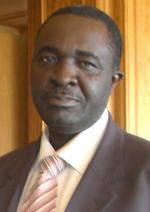Frédéric Chavanne pays tribute to Michel Kipoke, a fellow fighter for peace.
 Michel Kipoke belonged to the large family of Initiatives of Change. On 27 June , 2007, he died after a four week illness. Together with Thomas Ntambu and Bonaventure Nkeshimana, he had since 2000 been the architect, strategist and active member of a peace initiative in the Great Lakes region of Africa. Yet he thought in terms of the whole African continent and had become particularly involved in the Ivory Coast, where he was shortly due to return.
Michel Kipoke belonged to the large family of Initiatives of Change. On 27 June , 2007, he died after a four week illness. Together with Thomas Ntambu and Bonaventure Nkeshimana, he had since 2000 been the architect, strategist and active member of a peace initiative in the Great Lakes region of Africa. Yet he thought in terms of the whole African continent and had become particularly involved in the Ivory Coast, where he was shortly due to return.
A native of the Democratic Republic of Congo (DRC, formerly Zaire) and from the same ethnic group as Patrice Lumumba (the Batetelas) he was a qualified doctor of maritime law and tried returning to the country at the end of his studies to practise his profession. There he refused to be involved in dubious practices and went into exile. It was from France that he worked, impressively available, courageous and ever ready to go to areas thick with armed groups, where it was not always clear where loyalties lay. His aim was to meet the rebels, men on the run who may be dangerous to approach.
In his fight for peace, his principal weapon was listening. I remember our first conversations 25 years ago, when we had only just finished our studies; he had told us one day that it was through Initiatives of Change he had learned to listen. 'Before that,' he said, 'I didn’t listen; I only thought about assembling my arguments so I could better dominate the discussion.'
He had succeeded in winning the confidence of many African leaders, notably on opposing sides of the conflicts in Burundi and the DRC. His moderate attitude had a calming effect. As a true visionary, he had a prophetic vision for Africa; not that he foresaw the future, but he sensed and knew how to express what had to be achieved in order to resolve the conflicts. A man of spiritual depth, he had grasped the relevance of the message and approach of Initiatives of Change and applied this to the African situations he understood so well.
Many leading figures would come to consult him and found in him an excellent point of reference. One such was General Nkunda, a much feared figure in East Congo who had read a memorandum on the Congolese situation which Michel Kipoke had written and was determined to meet him when he visited the region in October 2006. 'When I read this document,' the general told him, 'I understood that there were still people capable of listening to us.'
His knowledge of men gave him great clarity about the faults and motivations of the people he met but he had this exceptional strength which allowed him not to judge them and always to look for ways to encourage. He was warm and friendly, with a great sensitivity to others and a quality of understanding and compassion which touched people’s hearts. Underlying his words of wisdom lay much research and cross-checking of information from a wide variety of people. 'He has been one of the best to explain to our listeners what is at stake in the various crises convulsing the Great Lakes region of Africa ever since the mid 1990s,' claimed Madeleine Mukamabano, presenter of the radio programme Le Débat Africain broadcast every Sunday morning on Radio France International. 'And we all remember his assessments, which were always clear, relevant and impartial, stamped with tolerance.'
Michel Kipoke worked tirelessly to create bonds of trust between men. What he was and what he accomplished stands as a model and a reference. It challenges us to reflect on our motives and our actions so we too may be reconcilers of men and builders of peace.
translated by Mary Jones


